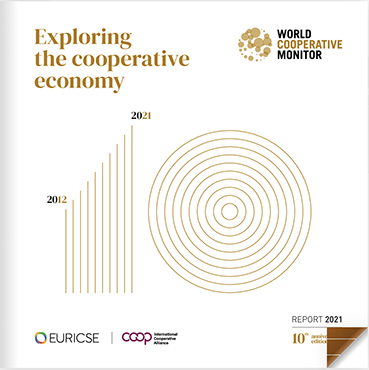The International Cooperative Alliance (ICA) and the European Research Institute on Cooperative and Social Enterprises (Euricse) launched the 2021 edition of the World Cooperative Monitor, during the ICETT Think Tank Seminar, preceding the World Cooperative Congress (Seoul, 1-3 December). 2021 marks the 10th edition of this annual report and continues the analysis on the reactions of cooperatives to the crisis COVID-19 emergency and how they are pursuing the achievement of the Sustainable Development Goals (SDGs).
The research and collaborations carried out over the last 10 years have provided the cooperative movement with a significant tool to evaluate its own positioning and have highlighted the importance of cooperation in the world to the public and to policy-makers. As a recent example, the UN Secretary General Report on “Cooperatives in Social Development” published in 2019 used the World Cooperative Monitor (WCM) to highlight the size of the global cooperative sector. The World Cooperative Monitor team works closely with the International Cooperative Entrepreneurship Think Tank (ICETT), a recently formed group of large cooperatives and cooperative groups engaged with ICA in the study and deepening of various issues related to the cooperative world.
Besides the economic and employment data of the Top 300 cooperatives and mutuals at the global level, the WCM 2021 edition gives special attention to two key global issues: first the impact of COVID-19 on large cooperatives, focusing on their reactions to the emergency as well as the actions planned to implement in the recovery phase; second, further the analysis on how large cooperatives are pursuing the achievement of the SDGs.
As for the impact of COVID-19, a series of 29 interviews carried out with large cooperatives around the world showed that participation and attention to members and community focus are key points that have guided cooperatives’ actions in recent months and that could be the pillars for disseminating a business model that embraces the goals promoted by the 2030 Agenda in terms of human rights, fair labor, environmental sustainability, and sustainable growth. These issues, as analyzed in the section on SDGs, are already at the center of many cooperatives’ agendas.
2021 Results – The Top 300
The Top 300 cooperatives and mutuals report a total turnover of over two trillion USD (2,180 billion USD), based on 2019 financial data. These organizations operate in various economic sectors, with “insurance” (102 enterprises) and “agriculture” (98 enterprises) leading the list. “Wholesale and retail trade” represent the third biggest economic sector (55 enterprises) in the ranking.
This year’s results show that, at the global level, the large cooperative groups are holding their own and turnover is growing slightly. In the Top 300 ranking based on turnover the largest cooperatives are performing well, with only slight variations in the top positions across the sectors. On the podium are the two French financial institutions Groupe Crédit Agricole (with 142,675 FTE employees in 2019) and Groupe BPCE (105,019 employees in 2019) and the German REWE Group (241,691 employees in 2019). Most of the Top 300 enterprises are from the most industrialized countries such as the USA (75 enterprises), France (35 enterprises), Germany (31 enterprises) and Japan (26 enterprises).
In the Top 300 ranking based on the ratio of turnover over gross domestic product (GDP) per capita – which relates the turnover of the enterprise to the wealth of the country – two Indian producer cooperatives reach the first and third positions: IFFCO and Gujarat Cooperative Milk Marketing Federation Limited. Between them, and in second place is the French Groupe Crédit Agricole.
Leading the sector rankings based on turnover are: the Japanese Zen-Noh in “Agriculture and Food Industries”; at the top of “Industry and Utilities” is Corporación Mondragón (Spain); in “Wholesale and Retail Trade” the German REWE Group tops the list; in the “Insurance” sector Nippon Life (Japan) leads the ranking; Groupe Crédit Agricole heads the “Financial services” sector; Sistema Unimed (Brazil) ranks top in the Education, “Health and social work” sector; and finally in “Other services” the Japanese Nihon Delica Foods Association is in the top position.
As Bruno Roelants, Director-General of the ICA, said: “The World Cooperative Monitor remains a significant tool for the global cooperative movement, helping it not only evaluate its own positioning but also highlight the importance of cooperatives to the general public and policy makers. Over the last ten years the Monitor has helped to deepen our understanding of various cooperative sectors and areas of impact. In addition to the Top 300 rankings, this year’s edition includes two chapters exploring how cooperatives can build back better from the pandemic and contribute to achieving the SDGs”.







